'Part of our extended family': How this refugee family found a new life in Iowa City
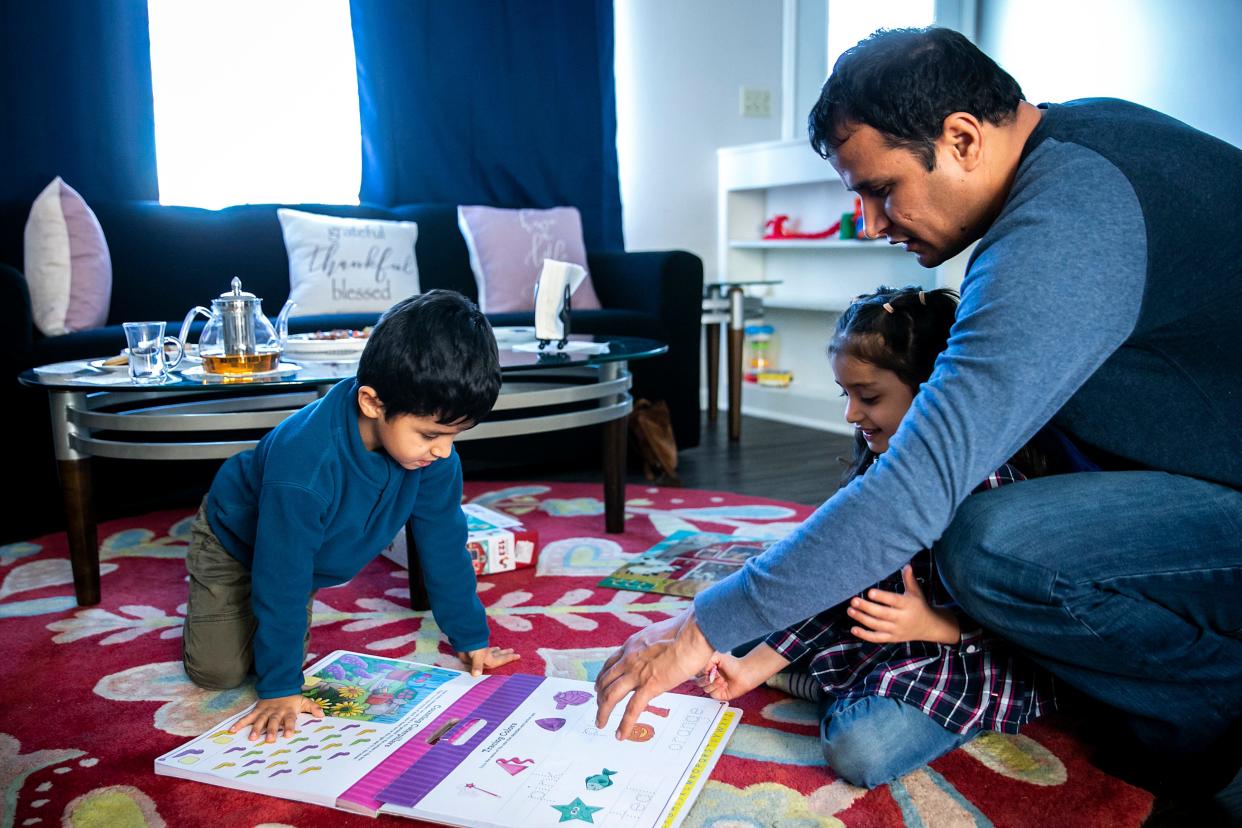
This is the second part of a two-part series about two refugee families living in Iowa City.
The sound of laughter and cheerful squeals of three young, energetic siblings fills the Azizis' home in Iowa City one January afternoon.
They put together a puzzle depicting a bright red barn and farm animals on the floor of their living room — the same room with the TV they accidentally damaged from too much indoor play — before quickly bringing out large hopper balls to bounce on and toss around.
Two-year-old Mohammad Yasin repeatedly loses his balance playing with the large ball, falling with a grin on his face, far too excited to care about anything else.
Meanwhile sister Omra, 4, and older brother Mohammad Abasin, 5, play around with each other.
It’s rather quiet outside in this southeast Iowa City neighborhood.
Most noticeably, there are no gunshots, a sound that sometimes rang out around the children’s home in Mazār-i-Sharīf, Afghanistan.
Father Hamayoon Azizi and mother Rukhsar told their children the sound was from a neighbor’s wedding.
But they knew better.
Life changed for the Azizi family following the Taliban’s return to power in 2021 as the U.S. military withdrew from the country and ended the 20-year war in Afghanistan.
Like hundreds of thousands of others, the Azizis fled their home, leaving family, friends and the familiar for safety. At the time, they didn’t know they’d end up in a city they’d never heard of located in America’s Midwest, all thanks to six community members who formed a Sponsor Circle.
Nor could they anticipate some of the meaningful relationships they’d make in the process of adjusting to life in Iowa City.
Over half a year journey to America
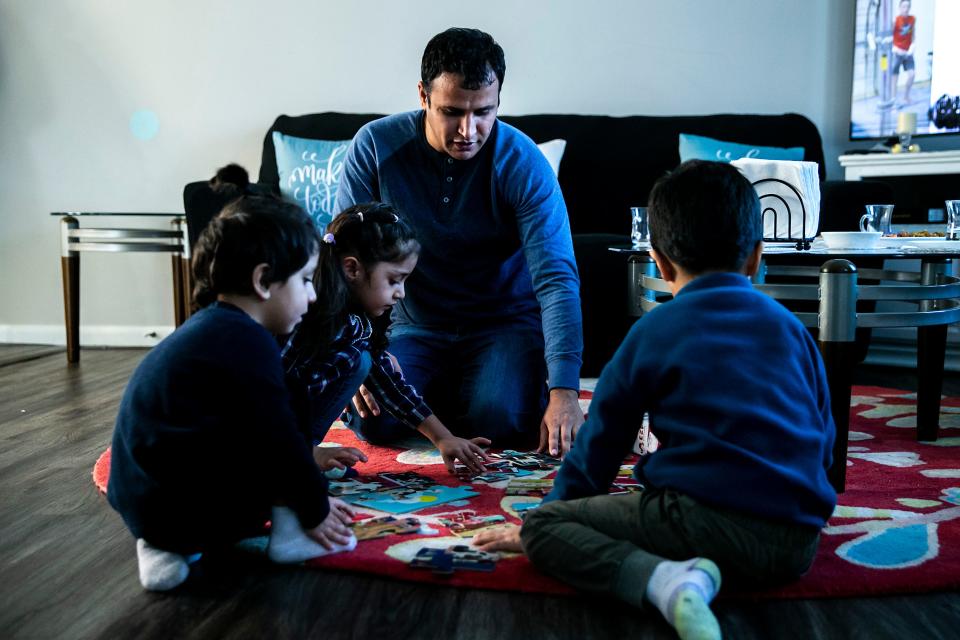
For about six-and-a-half months, the Azizi family lived within one of the largest Afghan refugee camps in Abu Dhabi in the United Arab Emirates. Emirates Humanitarian City, a facility housing Afghan migrants and refugees, made headlines last year as residents there protested its prison-like conditions and the slow resettlement process, Reuters reported in August.
Their room was small. There was no couch, no table, no chair. Just one double bed and one single bed for five people.
The food they ate was unfamiliar.
Life was boring.
It was also taxing on their morale, a seemingly endless period of waiting to get the green light to go to America.
More: A family of 3 fled Ukraine. Now, they live in Iowa City, where community members stepped up to help.
When the Taliban took control of Afghanistan, Hamayoon knew someone like him was at risk. He had worked with a private American company for just over three years, and that association could get him killed.
Supervisors assured him they’d help him, his family, and more than 100 other colleagues and their families flee the country.
What ensued were multiple attempts to leave over the course of a few months, made unsuccessful with challenges like lack of passports — causing the Azizi family to be turned away from the airport despite evacuation plans in place — attacks on airports, flight cancellations and fear.
Lots of fear, Hamayoon explained.
So much that a colleague of Hamayoon’s died by suicide.
Finally, on Oct. 26, 2021, the Azizis successfully left Afghanistan for Abu Dhabi, the capital of the United Arab Emirates.
They’d remain there until mid-May 2022, when they were finally allowed to come to Virginia to the National Conference Center. The Leesburg-based center had acted as a temporary housing facility for thousands of Afghan nationals who’d arrived to America as part of Operation Allies Welcome, which helped resettle vulnerable Afghans, including those who worked on behalf of the U.S., according to a Department of Homeland Security news release.
Hamayoon was to resettle in America through the Sponsor Circle Program, which launched in 2021 to allow eligible people to form a group of at least five to sponsor and provide the initial assistance to Afghans arriving in the country. The program was to complement the work of resettlement agencies, according to a U.S. Department of State news release.
Many of Hamayoon’s peers were wary of the new program. They recommended he not move forward with it.
He chose to trust his instincts and his luck. After all, he said, his family had made it to America with that.
In Afghanistan, Hamayoon had heard of California, Texas, Hawaii and New York, and other big states. He knew big cities, like Chicago.
He didn’t know Iowa, and the unfamiliarity made him hesitant to go.
But it was the same big cities that Hamayoon knew that other people at the National Conference Center warned him about. He’s new, and he has a wife and three children to support. Big cities would be expensive.
With that knowledge, Hamayoon agreed to move to Iowa City.
“When I come, I (feel) ready to come,” he said.
A Wilson’s Orchard & Farm trip reminds them of home
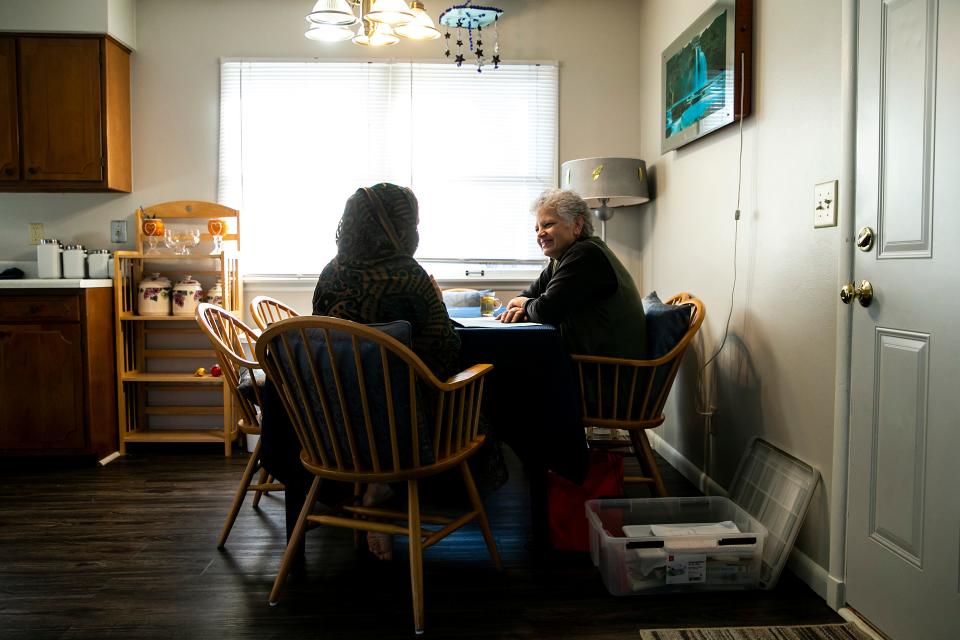
Eric Jones first learned of the Sponsor Circle Program following a tragic U.S. drone strike that killed 10 innocent people in Afghanistan earlier in 2021. It had moved him to tears.
He wanted to help. So did five others.
The members of the Sponsor Circle prepared for a family.
But for some time, they were without a match, ready to accept that maybe they would never get paired.
Until they did. Until they were having a phone call with Hamayoon, a “fairly stilted” conversation, Jones recalled — to be expected considering they were strangers who didn’t share the same language.
It was encouraging nonetheless.
The Azizis arrived late on June 6 at the Eastern Iowa Airport. Sponsor Circle members greeted the Azizis, with the help of Tony Razavi, an Iowa City community member from Iran who speaks Dari like Hamayoon and Rukhsar. He interpreted, making their arrival easier.
Sally Hartman was among the members who cooked an Afghan meal for the Azizis within the first week at their new home.
She said through their connections to other Sponsor Circles and folks involved in similar efforts, it was recommended to cook them a meal and make them feel at home.
The dishes they prepared included qabili palaw, a popular rice dish containing meat, carrots, raisins and spices, and zamarod palaw, a rice dish cooked with spinach and other seasonings.
“Well, they were very appreciative,” Hartman said. “However, later, we found out that the food we cooked wasn't that good.”
The Sponsor Circle has helped the Azizis fill out applications for the early childhood learning program Head Start, set up bank accounts, get them enrolled in English classes at Kirkwood Community College, arrange dental appointments, and more, Carol Tyx explained.
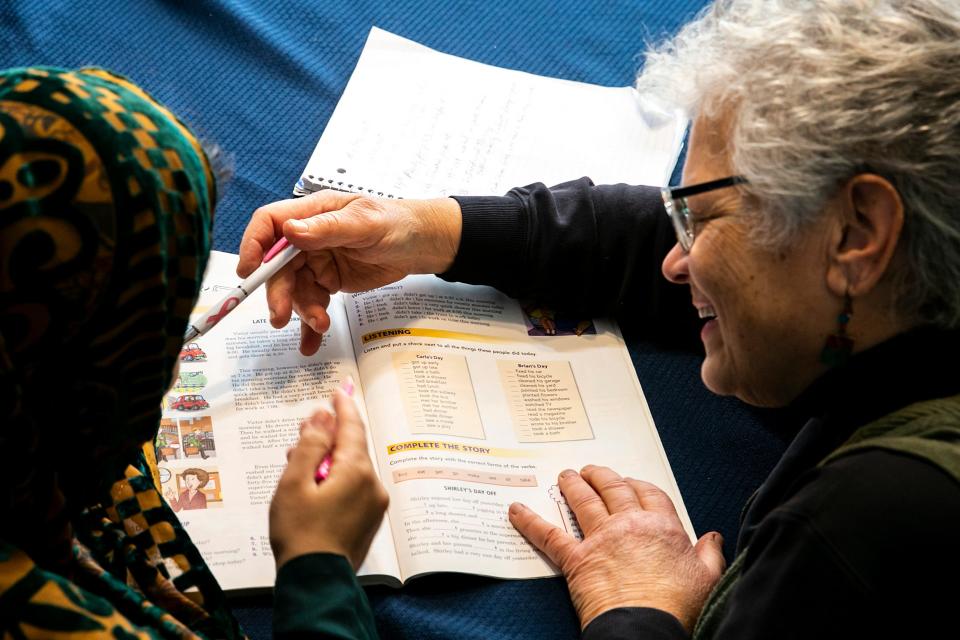
There have also been plenty of moments for fun, including a beautiful fall day Tyx and the Azizis spent at Wilson’s Orchard & Farm outside of Iowa City.
The children raced up and down the rows of apple trees. The day they went, the fruit had been picked over a bit, so they’d lifted the children up high to pick the apples.
Rukhsar packed some snacks for them to enjoy.
“We all sat in the grass and it's the kind of thing that they did in Afghanistan, being outside, going somewhere beautiful and enjoying each other in the surroundings,” Tyx said.
On weekends in Afghanistan, especially in the summer, Hamayoon said they’d travel somewhere for a picnic. Otherwise, they’d be spending time in their home with family, including his mother and two brothers.
“They talked about times that they had done things like that in Afghanistan and how much that meant to them to be in the orchard with us,” Tyx said.
Becoming a family
When Hartman recently accompanied Rukhsar to the dentist, she was treated to two large containers of foods that Rukhsar cooked.
She insisted that Hartman take it.
Hartman explained that the relationship between the Azizis and the members of the Sponsor Circle is mutual, both parties extending invitations to spend time together, including for birthday parties or for holiday gatherings, Tyx later mentioned.
Tyx said her children and grandchildren visit with the Azizis when they are in Iowa City.
“They're part of our extended family,” she said, clarifying that she meets with the family frequently separate from those visits. “Having them meet my extended family has been (an) important part of feeling like they are part of my close circle.”
‘Right now we want to fly’: The next phase of life in Iowa City
Should the Azizis have remained in Afghanistan under Taliban control, Rukhsar and Omra’s rights would have been severely restricted, with women exiting both the private and public workforce, whether it be due to finances, indirect coercion, or precautionary measures, according to a UN Development Program report released in October of last year.
Secondary education for girls remains “severely curtailed” in most provinces in Afghanistan, the report stated.
Food insecurity and poverty plague Afghanistan as well, according to the Council on Foreign Relations.
Life in Iowa City is simple. As Hamayoon puts it, it’s safe, public school education is good and free, and there are opportunities to find work.
“Right now we are happy,” he said.
Both Hamayoon and Rukhsar study English, the latter of the two learning rapidly, frequently praised by her tutor, her husband and members of the Sponsor Circle.
In mid-January, the Department of State in collaboration with the Department of Health and Human Services announced Welcome Corps, a new program where American citizens or permanent residents can privately sponsor the resettlement of refugees from around the world.
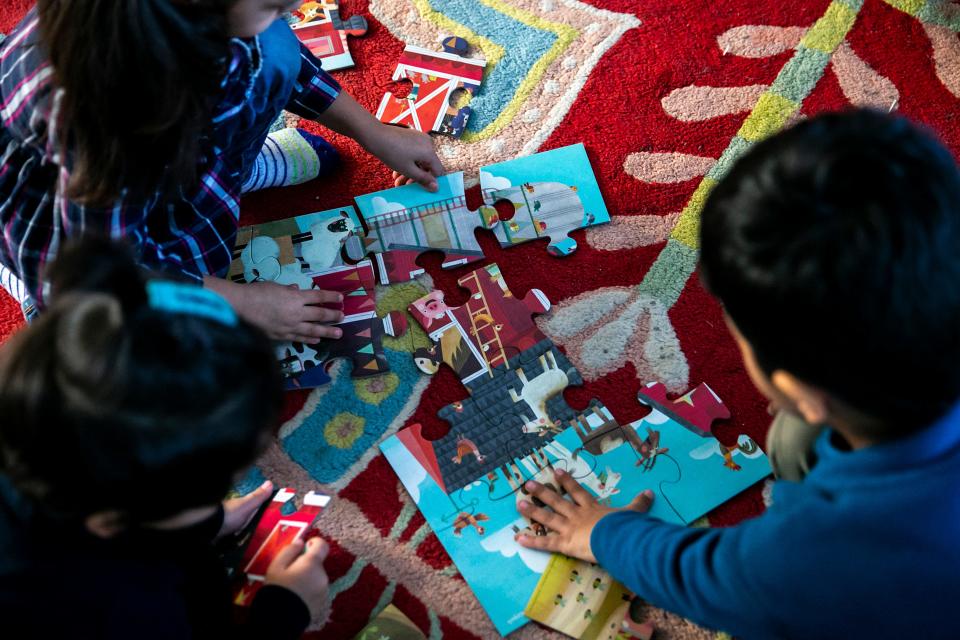
Hartman explained that there are phases to the Azizis' resettlement journey. The first they’ve achieved, from getting them acquainted with their home and neighborhood to getting enrolled for services like Head Start or English classes.
The next phase is getting them more integrated into the community.
Though the Azizis insist they don’t care about the fact that the members of the Sponsor Circle aren’t their age, Hartman does want them to form connections with people of their age, which may happen as their kids attend school and they meet fellow parents.
Community, Jones said, is something he believes they miss. Rukhsar used to regularly cook for dozens of family members, and it was that same large family that would help with parenting.
Though it’s hard to change, Hamayoon said, they want to.
One of those changes includes hearing how their young children, particularly daughter Omra, speak their native language with an increasingly American accent, Jones said.
For a long time, they were under pressure in Afghanistan, Hamayoon said.
“Right now we want to fly,” he said.
Paris Barraza covers entertainment, lifestyle and arts at the Iowa City Press-Citizen. Reach her at PBarraza@press-citizen.com or 319-519-9731. Follow her on Twitter @ParisBarraza.
This article originally appeared on Iowa City Press-Citizen: How these Afghanistan refugees found new family, life in Iowa City

